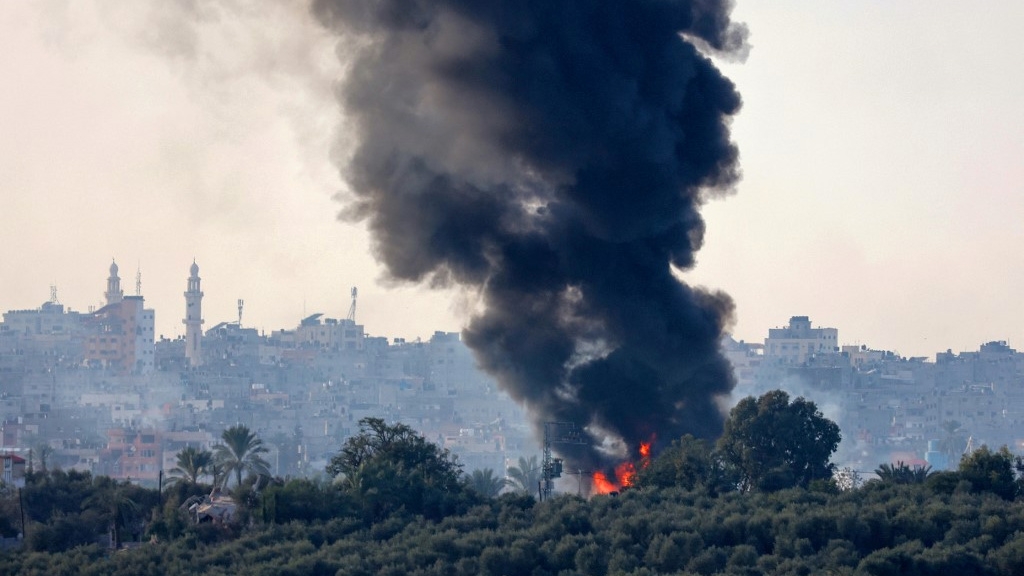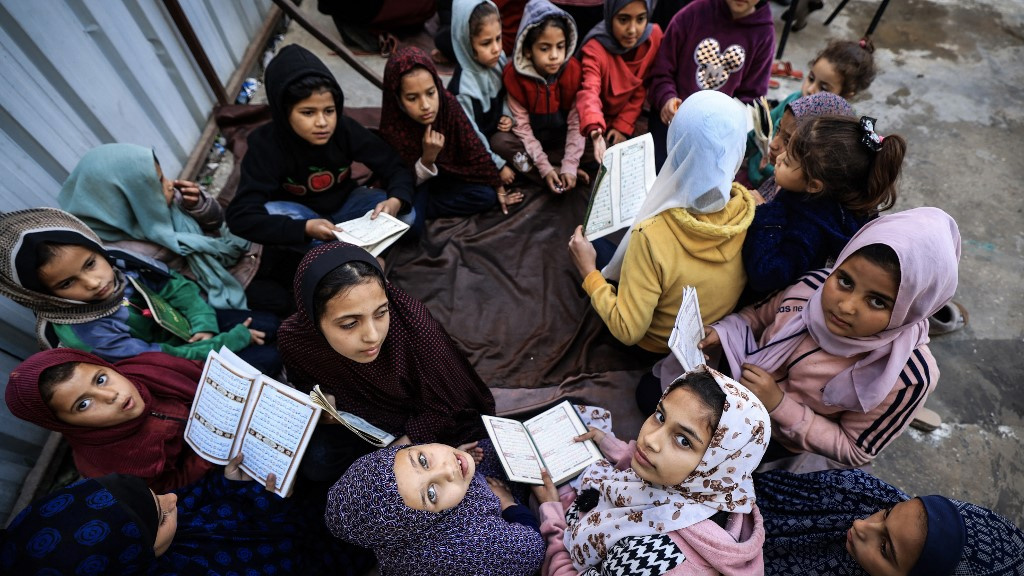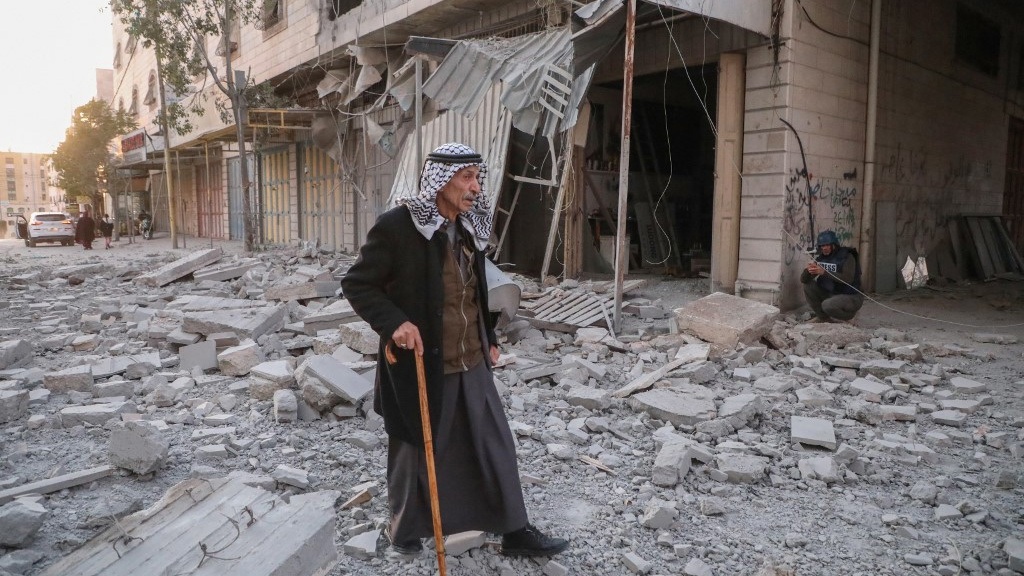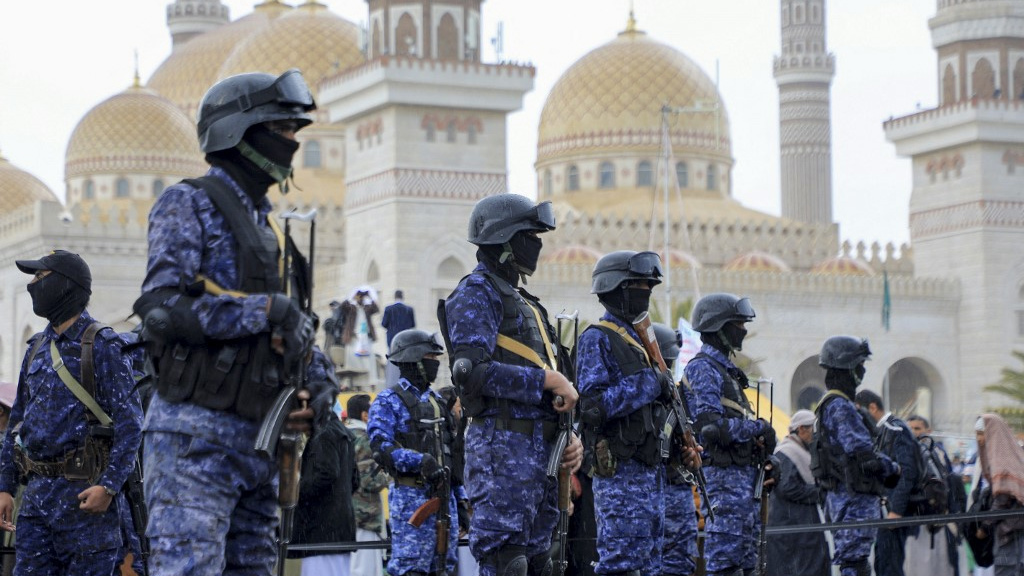Israel's war on Gaza has upended the region. What comes next?

Since Israel launched its war on Gaza last October, at least 27,000 Palestinians have been killed, and tens of thousands more have been injured.
Amid the relentless Israeli bombardment, hundreds of thousands of homes have been damaged or destroyed, and most of Gaza’s population of 2.3 million people have been displaced.
With Israel predicting the conflict will continue for months, this crisis will only deepen, with potentially catastrophic regional implications.
Here, six academics and researchers give their opinions on the ongoing conflict and what lies ahead.
Stay informed with MEE's newsletters
Sign up to get the latest alerts, insights and analysis, starting with Turkey Unpacked
Lessons from the first 100 days | Mouin Rabbani
Mouin Rabbani is a co-editor of Jadaliyya and a non-resident fellow at the Qatar-based Center for Conflict and Humanitarian Studies
The first 100 days of the Gaza war have changed the face of the Middle East. On 7 October, Israel’s pretensions of omnipotence, omniscience, invincibility and invulnerability were irrevocably shattered.
For the first time in 75 years, the Israeli military was forced to wage war within its own borders. It launched the most intensive bombing campaign in its history, razing much of the miniscule Gaza Strip to the ground, and killing Palestinian non-combatants at a scale and speed that, within three months, landed it before the International Court of Justice (ICJ) on charges of genocide. Israel has since its establishment been associated with genocide in the Western public imagination. Until now as victim, but for the rest of its days as perpetrator.
Israel’s severance of food, water, medical supplies and fuel to the occupied territory formed only one element of a very detailed South African charge sheet.
This engineered humanitarian emergency, and famine in particular, will now intensify as Israel’s Western sponsors suspended funding to Unrwa in revenge for the ICJ’s ruling that the genocide accusation against Israel is plausible.
Follow Middle East Eye's live coverage of the Israel-Palestine war
The official pretext is that Israel has made allegations, yet to be properly investigated or formally substantiated, that 12 of the UN agency's 13,000 employees in Gaza were, unbeknownst to it, involved with the Hamas military wing.
Israel’s war on Gaza is now its longest since 1948. But it has thus far failed to achieve any significant military objectives, which may well prove unattainable.
Israel’s military doctrine that wars must be short, decisive and fought on enemy territory has, similar to the Israeli army and its powers of deterrence on 7 October, collapsed like a house of cards.
Its utter dependence on the United States for military, political and diplomatic support has been laid bare, while this war has also shattered the image of a powerful bastion of western interests and influence in the Middle East. Although Hamas is hardly a significant military force, Israeli leaders have repeatedly referred to this conflict as one that will determine whether or not Israel continues to exist.
The question is whether peace, and peaceful co-existence, can be achieved in the Middle East in the presence of a genocidal, irrational state
Nonetheless, Israel remains a nuclear power, armed to the teeth with the most advanced US weaponry, and able to sow death and destruction with an intensity that can be observed even from outer space. The Gaza Strip as we have known it has ceased to exist.
In its efforts to insulate Israel from regional opposition to its decimation of the Gaza Strip, Washington has all but ensured a regional war whose consequences may well exceed those of its ill-fated invasion and occupation of Iraq. In the process, it has, along with the European Union, ensured the disintegration of the rules-based international order, which they have constructed over decades to ensure accountability for adversaries and impunity for allies.
It is at this stage impossible to predict when, how, or even if the guns will fall silent. Until they do, renewed talk in western capitals of a two-state settlement remains a diversionary charade, to be pursued with, at best, as little seriousness of purpose as in decades past.
To remove any doubts about its double-dealing, Washington in December voted against a UN General Assembly resolution re-affirming the inalienable right of the Palestinian people to self-determination.
To be sure, an end to the occupation and the establishment of a genuinely independent, sovereign Palestinian state remains feasible. What was possible in Algeria, Ireland and East Timor is also possible in Palestine.
The question, rather, is whether peace, and peaceful co-existence, can be achieved in the Middle East in the presence of a genocidal, irrational state that consistently seeks to unilaterally resolve political challenges with displays of overwhelming force - and responds to failure with even greater force.
Silence is betrayal | Ghassan Elkahlout
Ghassan Elkahlout is the director of the Center for Conflict and Humanitarian Studies and an associate professor at the Doha Institute for Graduate Studies
The enduring humanitarian crisis in the Gaza Strip is leaving an indelible mark on the region, raising concerns about the scant support provided to Palestinians by Arab states. Despite the Arab world’s asserted history of unity and shared values, there is a glaring absence of tangible support for the beleaguered population of Gaza.
The official Arab stance, while sadly unsurprising, has taken an alarming turn. Historical precedents of inadequate support for the Palestinian cause have now shifted to a rejection of the severance of ties with the occupying state. Some reports have even pointed to a trade corridor provided by Arab states to Israel as it grapples with the naval blockade imposed by Yemen’s Houthis.
There has been a cynical allowance for regulated protests, serving more as a tool to contain public anger than to actually challenge the blockade of Gaza.
There often emerges a fatigue in support as a conflict drags on. While global and regional attention shifts elsewhere, the immensity of human suffering in Gaza continues. Dire humanitarian conditions, and the erosion of dignity for hundreds of thousands of Palestinians - often displaced multiple times - has led some in Gaza to pray for a swift death, rather than continuing to live through the hellscape of genocidal collective punishment.
This will certainly be made worse by the short-sighted suspension of western funding to Unrwa, an organisation that undoubtedly provides crucial services to the Palestinian people in Gaza and elsewhere.
But as the war on Gaza approaches the start of its fifth month, there is an urgent need for public pressure to continue undeterred. As Arab regimes attempt to “weather the storm” without any impactful action that genuinely alleviates the suffering of the people of Gaza, the Arab street must not divert its attention from Palestine, nor allow Gaza to fade into obscurity. African and Asian football tournaments should be spaces of Palestinian solidarity and awareness.
Despite the rather limited space for popular mobilisation in Arab states, people must do what they can to alleviate the suffering of their brothers and sisters in Gaza. Arab health, educational and civil society institutions and organisations can play pivotal roles in supporting the Palestinian people.
In the medical sector, where Gaza’s resilience has endured for nearly four months amid the near-total destruction of facilities, Arab doctors can do their part. They should work to raise awareness and exert pressure on governments to dispatch field hospitals, medical supplies and experienced professionals to Gaza, and to highlight the ongoing health crisis on the global stage.
Gaza’s education sector, which has been sadistically reduced to rubble on live television, has been largely forgotten by Arab educational institutions. The murder of numerous academic professionals and students necessitates proactive engagement with Gaza’s educational institutions to ensure that Palestinian students are not set back years by the occupation’s unrelenting, genocidal war.
Urgent efforts should be made to host graduating students in critical specialties in neighbouring Arab countries, providing innovative solutions to help them stay on track in their educational pursuits.
Arab civil society organisations, and professional unions and syndicates, should seek avenues to pressure their respective governments to adopt stronger positions on the Gaza war. They could also seek to provide specialised support to their counterpart organisations in the Gaza Strip. This solidarity is the essence of Palestinian resilience.
Gaza must not be forgotten - and as it continues to face relentless bombing, isolation, fear, abandonment, famine and disease, it is imperative that popular Arab support grows stronger and louder. Arab unity and solidarity is more than a motto or a nostalgic story; it is part of the fabric of Arab identity. We must do more. Our silence is betrayal, and it is time to get louder.
How the international system failed | Tamer Qarmout
Tamer Qarmout is an assistant professor of public policy at the Doha Institute for Graduate Studies
The ongoing tragedy in the Gaza Strip is more than a regional conflict. It is a glaring lesson on the failures of the international system - one that must be echoed through generations to come.
Despite the brutal reality faced by Palestinians in Gaza, a situation characterised by many as a genocide, the international community continues to watch, its inaction amounting to complicity.
International law, a beacon of hope for justice and fairness, has unfortunately been caught in the crosshairs of global politics. This politicisation has undermined its effectiveness, leaving those in dire need of its protection without recourse.
In recent times, we have observed a slight but notable shift in the stance of western governments. Calls for a pause, truce or ceasefire have emerged, but these ring hollow as support and weapons continue to flow into Israel. This begs the question: are these shifts in position related to genuine concerns for the Palestinian plight, or are they merely political manoeuvring?
This change is not borne out of empathy for Palestinians or humanity at large. Instead, it is primarily a response to mounting domestic pressure
The global shift in opinion, which is increasingly favouring Palestine, has undoubtedly influenced these western stances. But this change is not necessarily borne out of empathy for Palestinians or humanity at large. Instead, it is primarily a response to mounting domestic pressure. Despite this, the urgency required for an immediate end to the conflict remains largely absent in western corridors of power.
As the 2024 elections approach, even US President Joe Biden’s somewhat softer tone on the conflict seems more like a strategic move to control potential electoral damage than a genuine shift in policy. This underscores the role of domestic politics in shaping foreign policy, often at the expense of humanitarian considerations.
In light of these international dynamics, it is imperative to consider other actors that could influence the situation positively. Turkey stands out as a significant player for both the Palestinians and the Israelis.
As a Nato member with strong ties to Palestine, Turkey could dispatch peace observers or forces in a post-conflict scenario, in addition to its potential to connect Gaza to the world through reconstruction. Egypt, too, could play a crucial role, given its geographic and political proximity to the conflict, particularly in terms of brokering a lasting peace and initiating reconstruction efforts alongside Turkey.
The Gulf Cooperation Council countries could also use their strategic relations, and political and financial leverage, to realise the aims of the 2002 Arab League summit, and to fund reconstruction and state-building projects for a future independent Palestinian nation.
Last but not least, international donors, and especially Muslim and Arab states, could use their leverage to ensure that future aid to Palestine is tied to tangible peace dividends and a sustainable and lasting political settlement to the Israel-Palestine conflict.
But it is crucial to understand that any discussions and decisions on the reality of “day after” governance in Gaza must be exclusively undertaken by Palestinians, regardless of what type of government this yields. It is high time to realise the mistakes of the Oslo Accords and to ensure that they are not repeated.
This must be done by reforming the Palestine Liberation Organization as the sole legitimate representative of the Palestinian people to encompass all parties, including Hamas and Islamic Jihad. Any attempt to force a mandate for the extremely unpopular Palestinian Authority (PA), especially one led by Mahmoud Abbas, will not provide a lasting solution to the question of governance in Gaza.
To this end, free and fair elections involving all elements of the Palestinian political sphere must be held - one where even imprisoned leaders, such as Marwan Barghouti, are allowed to participate.
As international institutions such as the United Nations and the International Criminal Court falter, the responsibility increasingly and disproportionately falls on the people themselves. By collecting evidence and pursuing legal action, individuals can help to hold accountable those responsible for the atrocities in Gaza.
The path to peace and justice may be fraught with obstacles, but the collective will of the people, coupled with strategic involvement from key regional and international players, could pave the way to a lasting resolution.
Crisis in the occupied West Bank | Amena ElAshkar
Amena ElAshkar is a research assistant at the Center for Conflict and Humanitarian Studies
While the Israeli government’s attention has been fixated primarily on the Gaza Strip in recent months, an equally critical situation confronts it in the occupied West Bank. Amid the severe humanitarian crisis unfolding in Gaza, the West Bank has been witnessing its own tumultuous developments, albeit largely overlooked.
The Israeli security agency Shabak has reported a surge in major attacks in the occupied West Bank, predominantly in the northern region, characterised mainly by shootings and knife attacks.
Concurrently, the Israeli army has been engaged in confrontations not only with established organisations, such as Hamas and Islamic Jihad, but also with newly formed local armed groups.
The period since 7 October has been marked by an alarming escalation in violence in the occupied West Bank, leading to a significant rise in Palestinian fatalities and injuries. More than 300 Palestinians have been killed, including more than 60 children, and thousands more have been injured.
Throughout 2023, Israeli forces killed at least 480 Palestinians and injured at least 12,000 across the occupied West Bank, marking the deadliest year for Palestinians in the territory since the United Nations began tracking this data in 2005.
Today, the apparent calm across the occupied West Bank is largely a result of pre-emptive actions by Israeli forces in known hotspots, including refugee camps and cities such as Jenin, Nablus and Tulkarm. Yet, this tranquil facade masks a profound shift in Palestinian sentiment, as captured in a recent poll that reflects growing support for Hamas (which is proscribed as a terrorist group in the UK and other countries) and for armed struggle as a means to end the Israeli occupation - a sentiment that is especially pronounced in the West Bank.
This shift suggests a brewing undercurrent of unrest, fuelled by a unifying sentiment as Hamas seeks to consolidate its influence across historic Palestine.
Will it be prepared for the likely outbreak of violence as life in the occupied West Bank continues to deteriorate?
Meanwhile, the economic situation in the occupied West Bank has deteriorated significantly due to the war in Gaza. Israel’s decision to ban around 100,000 Palestinian labourers from entering Israel to work, for “security” reasons has had a significant impact, disrupting incomes and harming the region’s overall financial health. In addition, disputes over tax revenues between Israel and the PA have affected the latter’s ability to pay its employees, further straining the economy.
Businesses in cities such as Ramallah are facing a downturn, with many locals having to sell personal assets to afford basic necessities. The International Labour Organization late last year reported an estimated 24 percent increase in unemployment in the occupied West Bank, equating to approximately 208,000 jobs.
These economic challenges, coupled with the ongoing conflict, have created a multifaceted crisis in the occupied West Bank. Amid reports that Israel is looking to replace Palestinian workers with labourers from abroad, the country will be confronted with a new reality if and when the violence subsides. Will it be prepared for the likely outbreak of violence as life in the occupied West Bank continues to deteriorate?
Gaza on the Jordanian streets | Mohammad Alhamawi
Mohammad Alhamawi is a research assistant at the Center for Conflict and Humanitarian Studies
The war on Gaza has reverberated across the region, igniting a rage that many might have thought was tamed in recent years. Perhaps nowhere is this as evident as in Jordan.
The streets of Amman and other cities across the country have captured popular sentiments. This genocidal war is a reminder that the fates of the peoples of Jordan and Palestine are inseparable. This is not a people in solidarity with another’s cause, but rather one people with one common struggle.
This is embodied in the words and actions of the people on the streets. For months, protests have erupted on the streets of Amman on a regular basis. A popular chant has called for the opening of a “Jordanian front”, which is unlikely at the moment, but not so far fetched given Israel’s growing hostility towards Jordan.
Protesters have repeatedly attempted to march towards the border, which many see as a natural act - an impulse that affirms that the people’s connection to their land will never be severed.
There have also been other major social changes, with celebrations and festivities halted as people mourn their kin west of the Jordan River. Christmas events were cancelled as a veil of grief cast its shadow over the country. Many on the streets feel that life cannot go on as normal as long as their kin are suffering. This emphasises the popular Arab adage that our afflictions and tragedies are one.
This sentiment has driven the people’s strict, and at times aggressive, commitment to boycotting certain companies deemed supportive of the occupying state, while local establishments have seen an uptick in support. This is based on the notion that frequenting any company supportive of Israel is akin to complicity in the genocide in Palestine. Even as officials warn of the negative consequences of the boycott movement on the Jordanian economy, the people have remained steadfast.
Many Jordanians have long been committed to the Palestinian cause. There is a popular rejection of any dealings with Israel, despite the government’s continued engagement with Tel Aviv over the years. Amid public pressure, Jordan recently cancelled a prospective energy-for-water agreement with Israel, highlighting the role played by the Jordanian street.
Over the past several months, however, public sentiments have become stauncher in terms of rejecting any engagement with the occupation - and firmer in their commitment to the Palestinian cause.
It is clear that the Israeli occupation’s war on Gaza has set its aspirations for the region decades back. The war has ensured that popular sentiments in Jordan will never turn on Palestine - at least not for several generations. The hope and conviction among members of the public that Palestine will be liberated in their lifetime will be far greater after the war ends than it was beforehand.
To many Jordanians, the Jordan River is not a border between east and west, and people on the streets continue to chant “one people, not two”.
Where do we go from here? | Sansom Milton
Sansom Milton is a senior research fellow at the Center for Conflict and Humanitarian Studies and an adjunct assistant professor at the Doha Institute for Graduate Studies
After nearly four months, the war on Gaza prompts a pressing question: what’s next? While the future remains uncertain, one thing is clear: the war has profoundly altered the political and conflict dynamics of the region - a significant consequence in itself.
At the global level, a resolution to the situation in Gaza is unlikely to be forthcoming. The ICJ ruling last week ruled that there are “plausible” grounds for considering Israel’s actions in the Gaza Strip to be a case of genocide yet stopped short of calling for an immediate ceasefire.
Whilst Indonesia and Slovenia will now pursue further actions against Israel through international law, the beleaguered population in Gaza will hold little hope for legal redress to end the war and lift the siege when confronted with an aggressor that has consistently violated international law for decades with almost no consequence.
Furthermore, the recent decision by various states, led by the US, to suspend funding to UNRWA in the midst of the world’s worst humanitarian crisis underscores the fact that whilst Israel’s allies are few in number, they can effectively dismantle the most effective international instrument to support Palestinians during their time of greatest need.
At the global level, the war's ripples across the Red Sea and Gulf of Aden signal a high risk of broader conflict. An escalation might embroil Hezbollah, Iraqi factions, and the West Bank, stretching Israel's military and posing unprecedented threats.
Direct involvement from regional and international players, such as Iran or a European naval defence force, risks transforming the conflict into a broader regional war. This could have catastrophic consequences for civilians and regional stability.
For instance, Houthi attacks restricting trade in the Red Sea and ineffective US-UK air strikes on Yemen illustrate the conflict's expanding regional footprint. Israel’s war on Gaza also ignited a previously non-existent front with Iraq, where various factions have since launched drone and missile attacks on the occupied Golan Heights and US bases across Iraq and Syria.
This has also worsened relations between the Iraqi government and US-led coalition forces in the aftermath of the latter’s air strikes on Iraqi soil. The Iraqi government recently requested a US withdrawal from Iraq and lodged a complaint at the UN Security Council.
The longstanding Israeli fear of a unified battlefield encompassing the occupied West Bank and Gaza has been compounded as this battlefield now extends to Iraq, Lebanon, Syria and Yemen.
Even if the war were to end today, there is no telling whether Israel would implode tomorrow
And the looming threat of escalation is not limited to an Israeli front. The brief Iran-Pakistan dispute, the Iranian air strikes in Erbil, and the threat of retaliatory Houthi strikes on US forces in Djibouti and the Red Sea all highlight that Israel’s war on Gaza is certainly not confined to 365 square kilometres.
While the potential for coordinated global action or regional escalation to transform the conflict dynamics remains an open question, the most likely route to an end to the daily tragedy and suffering lies at the domestic level.
As Israeli officials seek to manufacture consent for the continuation of their war on Gaza for another several months, there is little room for certainty on what path the region is set on. What is certain, however, is that it will not return to the pre-7-October status quo.
Analysts often highlight internal Palestinian divides as hindrances in the Israeli-Palestinian conflict, yet it is the deepening schism within Israeli politics and society that could profoundly impact the course of the war on Gaza.
The future of the incumbent prime minister clinging to office by pursuing a war of choice, the humiliating dissipation of Israel’s perceived military supremacy, and the rift between its traditional electoral politics and religious Zionist political parties collectively herald a troubled internal landscape.
With a reported surge in psychological disorders and suicides, the Israeli public is deeply polarised, wary of any illusory sense of safety.
Even if the war were to end today, there is no telling whether Israel would implode tomorrow.
The views expressed in this article belong to the authors and do not necessarily reflect the editorial policy of Middle East Eye.
Middle East Eye delivers independent and unrivalled coverage and analysis of the Middle East, North Africa and beyond. To learn more about republishing this content and the associated fees, please fill out this form. More about MEE can be found here.





.jpg.webp?itok=_RZ6fzRr)





